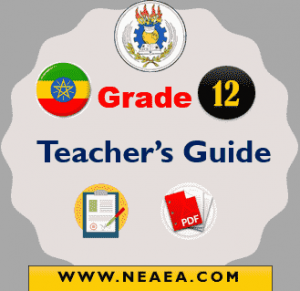Ethiopian Grade 12 Teacher’s Guide For All Schools (English medium) in Ethiopia: It is provided by the Ministry of Education. All teachers can download it PDF in PDF file. The Grade 12 Teacher Guide is based on the new Curriculum Framework for Ethiopian Education.
This Framework consists of the following major parts: the vision, principles of curriculum, key competencies, overarching issues, re-primary education curriculum, primary education curriculum, secondary education curriculum, and assessment and promotion.
Ethiopian Grade 12 Teacher’s Guide
In grade 12 there are two groups of specialization 1. Natural Sciences and 2.Social Sciences. There are five common subjects in both of these groups and four specialization subjects. Every teacher should carry out regular checks on the progress of all students in each subject. See also: Ethiopian Grade 12 Student Textbook [All Subjects]
This is done through continuous and formal assessment. It is intended to be a spontaneous and natural part of the teaching and learning process, not merely an activity that takes place at the end of the term or year. It should ensure that students at all levels are genuinely able to achieve the competencies expected of them.
1. Natural Sciences Teacher’s Guide |
*Common Courses Teacher’s Guide
|
2. Social Sciences Teacher’s Guide
|
*ElectivesMother Tongue/ Nationality Language
|
Grade 12 Periods Per Week
There will be some teaching strategies, which are specific to a particular subject but many active approaches can be used across the curriculum. Teaching strategies, with examples, will be examined in detail for each subject in the curriculum.
The use of different strategies will have to recognise the class sizes in Ethiopian schools. There are major training implications in order for new teaching methods to be implemented effectively. A wider range of activities needs to be written into curriculum materials. The following table shows the Second cycle Secondary Education (Grade 12), 35 periods/week
Natural Science |
|
|
Subject list |
Periods Per Week (P/W) |
Specialised Courses
|
P/W
|
Common Courses
|
P/W
|
Elective Course
|
P/W
|
|
Total periods per week |
35 |
Social Sciences |
|
Specialised Courses
|
P/W
|
Common Courses
|
P/W
|
Elective Course
|
P/W
|
| Total periods per week | 35 |
Analogies: concepts are explained by making a comparison with another system e.g. the working of the human body can be compared with the division of labour in a factory.
Arguments for and against an issue: Students consider an issue e.g. the benefits and drawbacks of plastics, and then decide whether they are ‘for’ or ‘against’. They can summarise this in written form and could also give verbal feedback.

